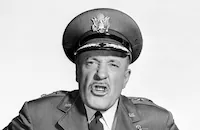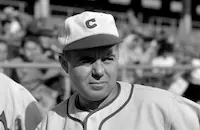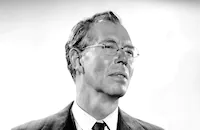The Unsuspected

Brief Synopsis
Cast & Crew
Michael Curtiz
Joan Caulfield
Claude Rains
Audrey Totter
Constance Bennett
Hurd Hatfield
Film Details
Technical Specs

Synopsis
During a broadcast of radio personality Victor Grandison's show, Roslyn White, his secretary, is found hanged in his office. At the same time, his niece, Althea Keane, holds a party in honor of his birthday. The unexpected arrival of Steven Francis Howard, who claims to have been married to Matilda Frazier, Victor's other niece, interrupts the party. Matilda, who was engaged to marry Althea's husband Oliver, went abroad to get over his loss, and is thought to have drowned after a shipwreck. When Victor arrives with Jane Moynihan, his director, he is stunned to learn about Matilda's marriage, especially because her estate is about to be settled. Steven informs Victor that he knew nothing about Matilda's money, but in any case, is a wealthy man in his own right. Victor then invites Steven to stay in his home while policeman Richard Donovan secretly investigates his story. Meanwhile, Victor receives a telegram from Matilda, who was rescued and hospitalized in Brazil. Steven meets Matilda's plane, but she does not remember him or the marriage. To her surprise, however, he knows all about her and the others in the family. To corroborate his claims, he takes her to the justice of the peace who married them. Although the man recognizes Matilda, nothing seems familiar to her. Later, Matilda and Althea quarrel over Oliver, who is now drinking heavily. Still suspicious of Steven, Victor goes through his clothes and finds a snapshot of Roslyn. Elsewhere, Steven meets secretly with Jane, who is convinced that Roslyn did not commit suicide and shows him a letter that implicates Victor in her death. Steven then shows the letter to a skeptical Donovan, who explains that Victor was broadcasting at the time of Roslyn's death. Later, Victor overhears Althea tell Steven that she telephoned Roslyn the night of her death and heard her scream. Victor then records a quarrel between Oliver and Althea during which Oliver threatens to kill her, and afterward orders Oliver to leave the house. Under questioning, Althea tells Victor that she believes he killed Roslyn. Victor admits that he killed Roslyn when she discovered that he had misused Matilda's estate and then kills Althea, making it appear as if the killer was Oliver. Later, Victor cuts the brakeline on Oliver's car, and he dies in the ensuing accident. Steven tells Matilda that he has deceived her about their marriage. Explaining that he had been engaged to marry Roslyn, who he believes did not commit suicide, Steven warns Matilda that she is also in danger. Matilda, however, refuses to believe that Victor is behind the deaths. After he learns that Matilda is in love with Steven, Victor tricks her into writing a suicide note, which he intends to use to cover up her murder. When Victor discovers Steven with the recording he made of Oliver and Althea, he blackmails Press, a murderer, into kidnapping Steve and then gives Matilda a poisoned drink. The drink does not kill her, however, and when she regains consciousness, she realizes that Steven was telling the truth and calls the police. With her help, they find an unconscious Steven in a garbage dump, where Press has left him to be crushed to death. Realizing that he can no longer escape, Victor then confesses to his crimes during his final broadcast.

Director

Michael Curtiz
Cast

Joan Caulfield

Claude Rains

Audrey Totter

Constance Bennett

Hurd Hatfield
Michael North

Fred Clark
Harry Lewis
Jack Lambert

Ray Walker

Nana Bryant

Walter Baldwin
Barbara Woodell

Douglas Kennedy
Ross Ford
Art Gilmore
Lucille Vance
David Leonard
Cecil Stewart
Faith Kruger
George Meader
Bob Alden
Dick Walsh
Bunty Cutler
Ray Montgomery
Eddie Parks
Eleanor Counts
Alan Ray
Jean Andren
Hal Craig
Jack Cheatham
Joleen King
Harriet Mathews
Martha Crawford
Wendy Lee
Leslie Hewitt
Crew
George Amy
Milo Anderson
Harry Barndollar
Woody Bredell
Everett A. Brown
Robert Burks
Leo F. Forbstein
Anton Grot
Charles Hoffman
David C. Kertes
Jack Meredyth Lucas
Ranald Macdougall
Bess Meredyth
Leonid Raab
Frederick Richards
Robert G. Vreeland
Franz Waxman
Perc Westmore
Howard Winterbottom

Videos
Movie Clip




Trailer
Film Details
Technical Specs

Articles
The Unsuspected
For The Unsuspected, Claude Rains' mellifluous voice was perfectly put to use in an atypical leading role as Victor Grandison, the host of a true-crime radio program. Following the mysterious death of an employee at his mansion, Rains becomes embroiled in an elaborate plot involving impersonation, blackmail and murder. Things begin to unravel when an enigmatic young man appears on his doorstep and attempts to solve the killing in the Grandison home.
Rains had worked with director Curtiz on nine other films, including Casablanca, and the Errol Flynn vehicles, The Adventures of Robin Hood (1938) and The Sea Hawk (1940). As for Curtiz, The Unsuspected marked his first venture as an independent producer.
Originally seeking Orson Welles for the part that eventually went to Rains, Curtiz also was forced to bypass his initial choice of Jennifer Jones (and then Joan Fontaine) for the part of Rains' niece. Instead he cast Audrey Totter, a rising starlet featured in several notable noirs, including The Postman Always Rings Twice (1946) and Lady in the Lake (1947), opposite Robert Montgomery. Although Curtiz could be a tyrant on the set, Totter got along well with him and later admitted (in Dark City Dames by Eddie Muller), "He liked my work, and wanted to put me under personal contract. He'd started his own company and Doris Day was the only other one he'd signed up. But Metro wouldn't let him have me. I'm glad they didn't, because his company didn't pan out, and was folded into Warners. Bette Davis was there, Ida Lupino - people who would have played my parts."
Totter recalled the shoot as a pleasant experience, although Curtiz was a workaholic who demanded the same from his cast and crew. His wife claimed that, although he slept only five hours a night, he often talked in his sleep about films. While shooting The Unsuspected, the director once commandeered guests at his own dinner party, rearranging food and seating arrangements to try out different set-ups for the shoot of the dinner-party sequence in the film.
Yet, even with Curtiz's skilled direction, Bredell's evocative cinematography, sharp dialogue, and a first-rate cast including Constance Bennett in a notable supporting role, The Unsuspected was not an immediate hit with critics. The New Yorker labeled it "a seedy mystery in which the corpses of murdered people are piled around like buns in a bakery's day-old shop." Even Curtiz later admitted, "It looks as though I tried to make a great picture out of a story that wasn't basically a great story." However, Curtiz scored an immediate box office hit with the other film he directed in 1947, the acclaimed portrait of family life in turn-of-the-century New York City, Life With Father.
In recent years The Unsuspected has been singled out as an underrated example of the genre and is chock full of quintessential noir scenes like this one described by Carl Macek in Film Noir: An Encyclopedic Reference to the American Style: Jack Lambert as the blackmailed killer lies in bed smoking. The radio is on and Victor Grandison is detailing the story of his particular crime. The only source of illumination in this dingy hotel room comes from a partially obscured flashing neon sign. The letters that are visible through the window seem to echo the thoughts of the uncomfortable murderer as it keeps blinking "Kill...Kill...Kill."
Director: Michael Curtiz
Producer: Charles Hoffman Screenplay: Ranald MacDougall, Bess Meredyth, based on the novel by Charlotte Armstrong
Art Direction: Anton Grot
Cinematography: Woody Bredell
Costume Design: Milo Anderson
Film Editing: Frederick Richards
Original Music: Franz Waxman
Principal Cast: Joan Caulfield (Matilda Frazier), Claude Rains (Victor Grandison), Audrey Totter (Althea Keane), Constance Bennett (Jane Moynihan), Hurd Hatfield (Oliver Keane), Fred Clark (Richard Donovan), Jack Lambert (Mr. Press).
BW-104m. Closed captioning.
by Genevieve McGillicuddy

The Unsuspected
Quotes
The nicest thing about guests is their departure- Victor Grandison
You're as limp as an old girdle- Jane Moynihan
You don't look like you could deny yourself anything- Steven Howard
I generally get what I want- Althea Keane
Trivia
Notes
Charlotte Armstrong's novel was serialized in The Saturday Evening Post between August 11, 1945 and September 29, 1945. This was the first film made for Michael Curtiz' independent production company. A September 5, 1945 press release announced Robert Alda as the film's star. Although onscreen credits read "introducing Michael North," North acted under the name Ted North in the 1930s.















